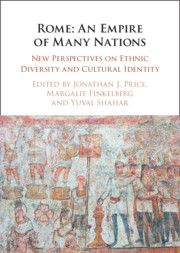Book contents
- Rome: An Empire of Many Nations
- Reviews
- Rome: An Empire of Many Nations
- Copyright page
- Contents
- Figures
- Contributors
- Acknowledgments
- Abbreviations
- Introduction
- Part I Ethnicity and Identity in the Roman Empire
- Part II Culture and Identity in the Roman Empire
- 5 Roman Reception of the Trojan War
- 6 Claiming Roman Origins
- 7 Roman Theologies in the Roman Cities of Italy and the Provinces
- 8 The Involvement of Provincial Cities in the Administration of School Teaching
- 9 Many Nations, One Night?
- Part III Ethnicity and Identity in the Roman Empire
- Part IV Iudaea/Palaestina
- Bibliography
- General Index
- Index Locorum
7 - Roman Theologies in the Roman Cities of Italy and the Provinces
from Part II - Culture and Identity in the Roman Empire
- Rome: An Empire of Many Nations
- Reviews
- Rome: An Empire of Many Nations
- Copyright page
- Contents
- Figures
- Contributors
- Acknowledgments
- Abbreviations
- Introduction
- Part I Ethnicity and Identity in the Roman Empire
- Part II Culture and Identity in the Roman Empire
- 5 Roman Reception of the Trojan War
- 6 Claiming Roman Origins
- 7 Roman Theologies in the Roman Cities of Italy and the Provinces
- 8 The Involvement of Provincial Cities in the Administration of School Teaching
- 9 Many Nations, One Night?
- Part III Ethnicity and Identity in the Roman Empire
- Part IV Iudaea/Palaestina
- Bibliography
- General Index
- Index Locorum
Summary
The colonies and municipalities of Italy and the provinces were not merely representations of Roman traditions. How, then, can we understand the theologies of the cities? It is possible to do this through general theological discourse, since the local elites had received the same education as Romans. But there were certainly differences, albeit not apparent to us because of our lack of precise information about the local mythologies and deities. A study of the public gods of certain cities in Gallia Belgica and Germania Inferior allow us to discern certain factors that could be behind the theological rationale that was to emerge at the moment that local magistrates defined the religious obligations of the new city foundations. Two examples allow a glimpse into the inspiration for the creation of private divinities in Latin literature.
Keywords
- Type
- Chapter
- Information
- Rome: An Empire of Many NationsNew Perspectives on Ethnic Diversity and Cultural Identity, pp. 116 - 134Publisher: Cambridge University PressPrint publication year: 2021

